Valentina* drove two hours up the California coast to the flat farming town of Santa Maria and stopped outside a white motor home. “Silvia,” she sang, tilting her head out the car window on a recent afternoon. With broad shoulders and dyed-blond hair framing her soft face, Valentina is striking even without her signature crystal-encrusted shoes. Silvia looked up from the cactus she was planting and walked to the car. She dangled her crimson fingernails for Valentina to admire. Valentina, who is 60, had been encouraging her to indulge in little luxuries, like walks on the beach or manicures, and she smiled at the sight of Silvia’s hands. Like Valentina, Silvia is from Mexico, and she was trying to leave her partner.
Since the mid-’90s, Valentina had assisted hundreds of Latina women who were beaten at home, harassed at work, assaulted. She had a particular affinity for Silvia, whom she’d met a few years earlier. Silvia was reserved, a truck driver, a mother of five who often looked defeated, with deep lines around big brown eyes, her shoulders folded in. She had come to the United States in 1985 as a teenager to join her father, and she’d been with her partner for nearly 30 years.
The two women drove to a bakery at a nearby mall, where they sat under fluorescent lights discussing Silvia’s options once again. Valentina was the first person Silvia had told about her problems at home. She didn’t want to call the police or go to a shelter. She wasn’t ready for the courts. Her partner had one domestic-violence report already, and if she accused him now, he’d likely be picked up by Immigration and Customs Enforcement. “If he were deported because of me, because of my situation, I think I’d lose my kids completely,” she started to ramble. She still had two children in the house, and she worried their father would take them to Mexico. “But if you had an emergency,” Valentina asked, “you’d call me, right?”
Valentina isn’t a social worker or a therapist or a lawyer. She is an immigrant who opens her home to women whose husbands or boyfriends abuse them. The women who come are waitresses, saleswomen, fruit and vegetable pickers, housecleaners. Like Silvia, many are ashamed, reluctant to point a finger or to file for divorce. Most are undocumented, and before President Trump’s election, they went to Valentina when they didn’t know their rights or when shelters didn’t have space. Since Trump, even those with papers avoid shelters and mistrust the law. Silvia had stayed at Valentina’s house for a week, and now Valentina has taken to checking on her. She’s hoping Silvia will leave her partner, but she can’t predict if she will or how long it might take.
Valentina opened her house to women, in part, because no one had for her. She’d arrived in California from Mexico in 1980 to be with her husband and almost immediately became pregnant. The violence started with slaps in the face. Once, he threw a can of tomatoes, which hit her in the eye; she covered the bruises with black oversize sunglasses. On one of the worst evenings, her husband came home drunk, and Valentina encouraged him to eat dinner, hoping it would cut the alcohol. Instead, he smashed potted plants on the kitchen floor, poured beer over the shards and soil, and shoved Valentina to the ground, yanking her long hair back and forth over the mess, like a mop.
Without family in the States, Valentina’s world was limited to cobbled-together jobs and weekends with her young kids. She wasn’t aware of any shelters, and when she called the police, they told her husband to take a walk. The priest at a nearby church said if she kept praying, it would get better. It didn’t, and after a few years, she began preparing to leave. She took night classes toward a nursing degree and applied for legal status under President Reagan’s amnesty program, secretly putting away savings.
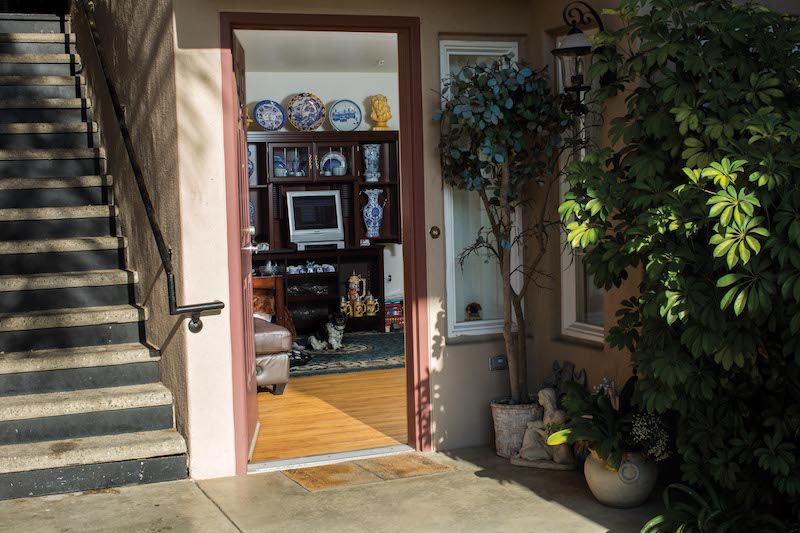
Outside Valentina's home.Image: Cinthya Santos Briones/The California Sunday Magazine
When she found letters her husband kept from a lover, that was it. She took her four kids from their stucco home in a residential neighborhood to a dark two-bedroom apartment wedged between a butcher and a travel-insurance agency. She was haunted by nightmares of her ex pointing a gun and cried nearly every day, talking out loud to herself, asking how she’d get by. She worked days at a rural health clinic, nights as a janitor, and Saturdays and Sundays selling jewelry or food samples at supermarkets.
She hadn’t grown up with violence in her home, so when her husband had hit her, it seemed foreign. Now, it was beginning to feel as if she were seeing it everywhere. At the clinic, she noticed bruises on her patients’ necks and overheard hints in colleagues’ conversations. She drew them out when they talked about men in their lives, picking up cues in the cadence of their voices. Soon a small number of women were asking for her help. A medical assistant called in need of a ride to the hospital after her husband branded her arm with an iron. A woman she’d sold jewelry to moved in with her two sons for a month.
Valentina knew to listen, to give guidance but not judgment if the women didn’t want to leave their relationships — it had taken her years to divorce her husband. What she could do was give the women a place to stay, the kind of reprieve that rich people could buy. She lent money, gave food, tended to the women when they arrived after beatings. Once, her kids came home to find her stitching someone up. Her son complained that she’d mistaken their home for a hospital. To Valentina, it was more like a shelter.
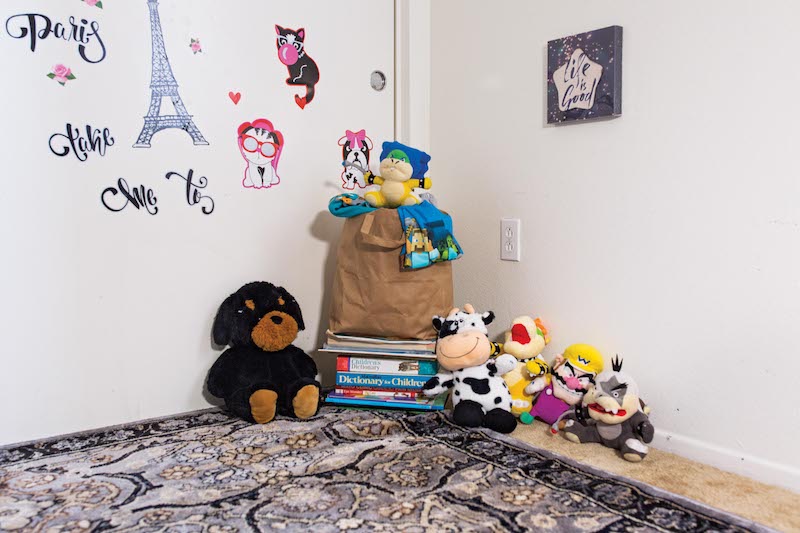
Many of the women who
arrive at Valentina’s bring their children.Image: Cinthya Santos Briones/The California Sunday Magazine
In 2008, about ten years after she’d started inviting women into her home, Valentina received a call from a friend at the clinic, asking if she’d meet with Mily Treviño-Sauceda. When they got together, Valentina learned that Mily was a founder of Líderes Campesinas, a group that organized female farmworkers. Mily, who was Mexican American, had begun working in Idaho’s potato fields with her parents at the age of 8, tagging along with her father to union meetings when she was a teenager. By the time she started Líderes, she was 30 and widowed, raising a young boy on her own.
Mily explained that Líderes had initially trained farmworkers on issues like pesticides and housing, but she kept hearing about domestic violence. She saw how its effects extended beyond the household: It stopped women from standing up for themselves in the fields. “In their stories, when they talked about how they were abused in the workplace, they then said, ‘How can I share that if my husband won’t believe me?’ ” If women couldn’t speak up in their own homes, they weren’t likely to speak up anywhere. This insight became a central tenet of Líderes. If they were going to fight discrimination at work — wage theft, health risks, sexual harassment — they needed to think about violence against women in both their public and private lives.
Valentina began attending Líderes meetings, where women from farmworker families shared meals and talked about the social services they could turn to. Some put on skits. Inspired by the tradition of Mexican street theater, where actors perform religious fables, these plays revolved around violence in the home. At times, the women sat in a circle, sharing details of how their partners mistreated them as others listened, consoled them, and assured them they had power. They discussed the statistics, too — how Latina women experience domestic violence at the same rate as white women, but for immigrants, the rate is nearly double — and the risks of leaving, when the chances of homicide are greatest.
Mily watched as women opened up to Valentina and noticed that they kept calling afterward. The two were opposites. Mily gave orders and hurried between appointments, beaded bracelets clinking on her wrist. She guarded her emotions behind quick eyes and tight lips. Valentina was an observer. In her typical black jackets, she stood back, nodding when spoken to. The pair had discovered they were born the same year and married the same year, and it seemed as though they were cosmically connected. Valentina slowed Mily down, and Mily ushered Valentina into a world where she wasn’t a one-woman show managing a crisis.
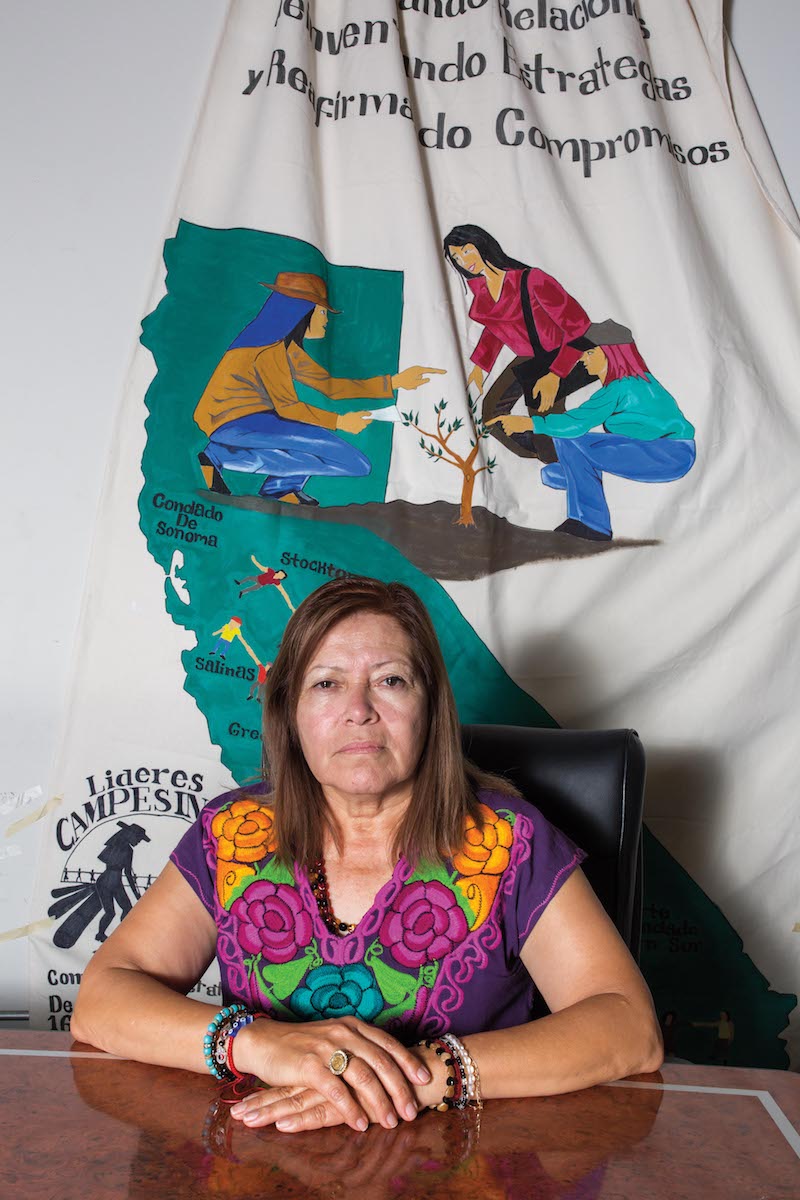
Mily Treviño-Sauceda, co-founder of Líderes Campesinas, a group that organizes female farmworkers.Image: Cinthya Santos Briones/The California Sunday Magazine
The same year Valentina met Mily, the government began offering new protection to immigrants who had been abused. As part of a reauthorization of the Violence Against Women Act, the U visa was created, and it provided immigrant victims of violent crimes with a path to permanent residency. When the Violence Against Women Act had first passed, in 1994, that relief was only available to immigrant survivors abused by violent spouses who were U.S. citizens or permanent residents. Most of the women Líderes worked with weren’t married to legal residents; many weren’t married at all. Mily had advocated to expand the law to protect unmarried survivors, and the U visa passed with bipartisan support under a condition: Victims could apply if they helped with the investigation or prosecution of the crime. It was a major win. Starting in 2008, undocumented women had far more to gain if they reported their partners. But the first step, Valentina saw, fell to women like her. She had to encourage Latinas to trust authorities while also keeping them safe.
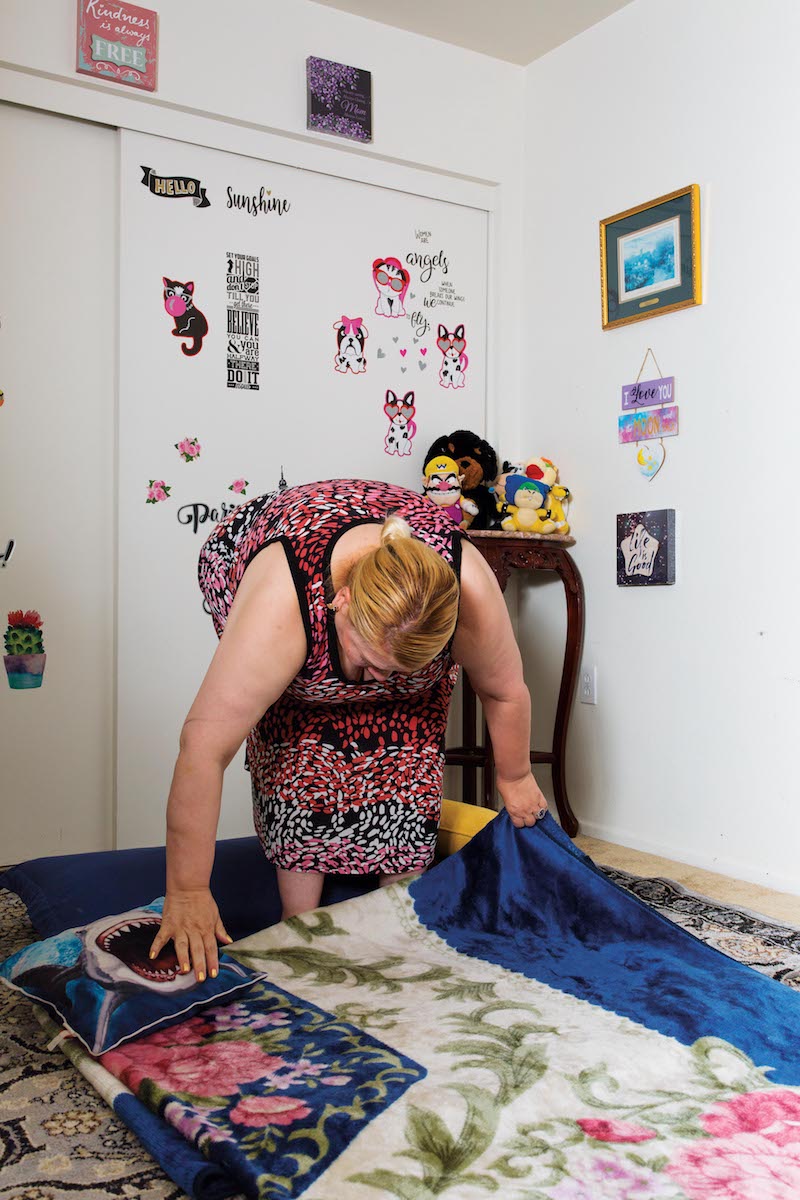
Valentina readying her spare room.Image: Cinthya Santos Briones/The California Sunday Magazine
In Mexico, Valentina had worked several years for law enforcement, and now she gave women tips for collecting evidence — save messages, take photos of bruises, keep a journal with dates and witnesses. She gathered business cards from social agencies and vetted the local shelters. When she told women their rights, many agreed to talk to the police. Although deportations rose under President Obama, these women didn’t feel they were targets — the administration was focusing on recent border crossers. Sometimes Valentina’s efforts paid off. She accompanied women to prosecutors, testified in custody cases, and personally served three men with divorce papers.
More often, though, Valentina was disappointed. The Violence Against Women Act included funds to train law enforcement and crisis centers on immigrant survivors, but the women she saw weren’t getting the support they needed. Women who went to the police often called sheepishly from the department, asking her to translate because no one spoke Spanish. For those who needed a safe place to sleep, she was initially excited to know that she could dial shelter staff. But not once was she able to get them in; there were just 28 beds in her county. She was outraged to discover that most agencies offered only around 15 sessions of free therapy. She knew it took far longer for women to recover.
Women continued to filter in and out of her shaded apartment nearly every day. When they stayed the night, they slept in the spare room decorated with inspirational phrases in cursive (“You’re never too little to dream big!” “Kindness is always FREE”). Some had bruises or were bleeding or had teeth marks, and she dressed them with arnica salve and drew baths. Valentina asked if they were feeling suicidal and whether there were weapons in the house. She began seeing more indigenous women from Latin America, who barely spoke Spanish. She sketched the outline of a human body on paper. “Did he hurt you here or here?” she’d ask, pointing to different limbs. She slept with her flip phone by her pillow in case the men arrived and she needed to call the cops.
One teenager moved into her house with two kids, her infant padding around on the thick blue carpet. She stayed in bed most of the day, waiting a month for her mom to travel 1,600 miles from Kansas City to pick her up. Most came for shorter stints. Some carried bags stuffed with clothes, others nothing at all, as if they’d fled without a minute to think. One had been chased off her ranch with a gun.
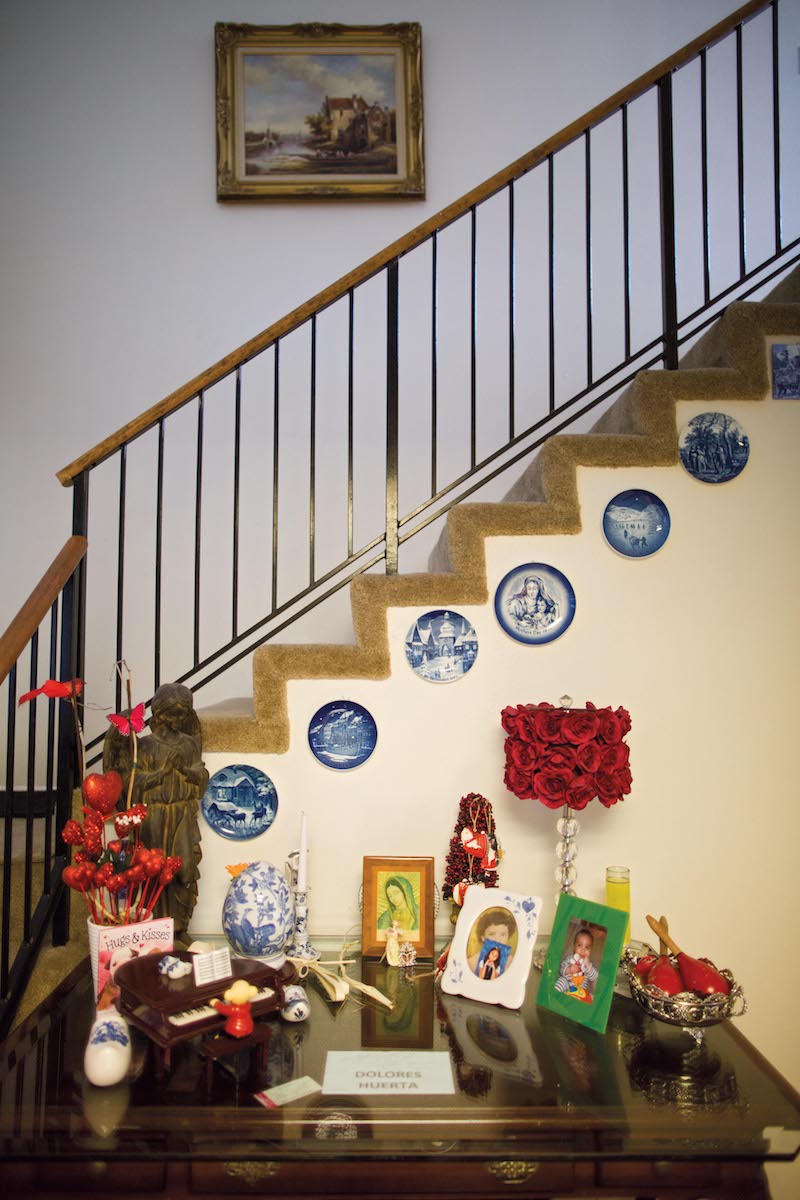
Inside Valentina's home.Image: Cinthya Santos Briones/The California Sunday Magazine
The election of Donald Trump sent more women underground. After the administration broadened enforcement, Líderes saw that the number of farmworkers writing their full names or addresses on sign-up sheets was shrinking. Fewer were coming to meetings. Valentina recognized that most of the women she saw didn’t want to report to authorities at all. Many said their partners threatened to call ICE if they did — a classic abuse tactic that had new force. Others fixated on the possibility that the men would be deported and they’d be left without child support. Now, more women were calling her, most out of fear, determined to avoid any interaction with officials.
Valentina wasn’t the only one noticing this shift; the other women opening their homes to survivors were hearing it, too. So was law enforcement. Within months of Trump’s inauguration, Los Angeles police had found that sexual assault reports among Latinos had fallen by a quarter. Half a year in, domestic violence reports had dropped 13 percent in San Diego and 18 percent in San Francisco. More than a dozen major rape crisis centers across California estimated that their Latina clientele had shrunk anywhere from 10 percent to 80 percent. For many women applying for a U visa, the police or a crisis center would be the first stop; if they didn’t help law enforcement, they wouldn’t qualify.
Even women who sought U visas were at risk. In 2014, the government was granting the visas to people who had filed five months earlier. By 2018, there was a significant backlog. Women whom Valentina helped file would likely wait nine years for a decision, and they could be removed from the country in the meantime. More than 117,000 victims had pending applications, and the visas are capped at 10,000 a year. The number of adjudicators has also dropped from 93 in 2014 to 60 at last count. This summer, Valentina watched on TV as the administration announced a new policy that anyone without legal status whose U visa is denied will be placed in removal proceedings. One mistake, and they’re deported, she thought to herself. They see the government rejecting them. They hear Trump talking about “illegal people.” They are now living in anonymous ways.
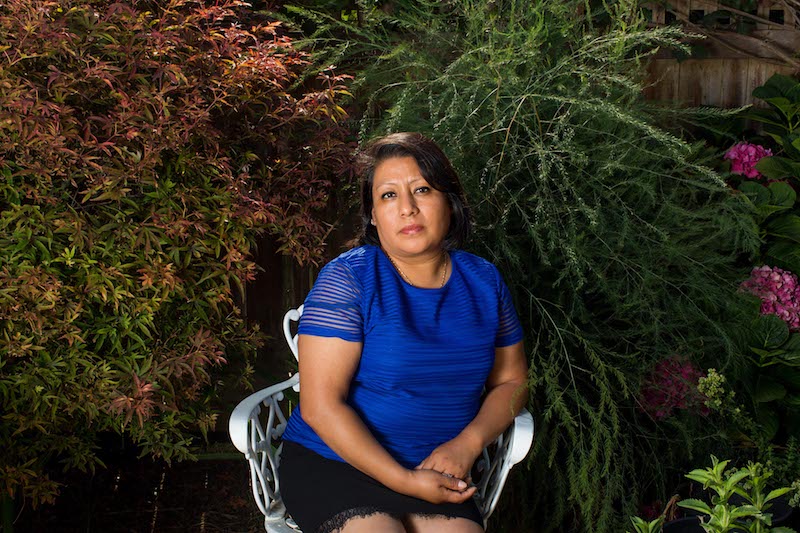
After a year of training, Elena started taking women into her home.Image: Cinthya Santos Briones/The California Sunday Magazine
In a sense, Valentina felt prepared. The number of women who opened their homes had grown. At conferences for female farmworkers in California, she had met dozens of them. She’d also started drawing in new allies — alternative-medicine practitioners, Mixtec interpreters, and a lawyer and child therapist who took Valentina’s cases for free. Mily had helped establish an umbrella organization for female farmworker groups across the country, and Valentina had gotten to know many of the women involved. When survivors were moving out of California, she knew whom to call in Florida, Illinois, Texas, Washington.
Gradually, she’d become a point person, and when Líderes members or other activists needed to find a home for a victim, they phoned her first. The women who took in survivors were mainly single, living in remote towns. Most had experienced domestic violence themselves, or had a relative who had, and knew how hard it was to leave without a trusted place to go. Valentina helped women new to this work navigate complicated cases, like victims who’d left behind medication they needed or those furnishing a new home without savings. Among one another, they discussed how to protect themselves from abusers but also how women might take advantage of their generosity. Valentina had lent money that was never returned and had given shelter to women who lied about their situations. Still, she said, that had never been a reason to stop.
Coordinating the network came easily to Valentina, whose calm, doting manner often landed her the role of a godmother, but she also wanted to expand it. She liked to distract herself by playing penny slots at the Chumash Casino, where she discovered that the neighboring city of Santa Maria was two-thirds Latino. She decided to train a woman there, and through a friend, she was introduced to a former farmworker. Elena was quiet and curious, with an oval face and skinny, arched brows. Though she was interested, she was sure she wasn’t qualified. She’d only ever worked in the fields and didn’t speak English or use a computer.
Valentina began waking up at dawn to drive to Santa Maria, more than 100 miles away, two or three times each week. She set up appointments at health clinics, food pantries, and churches, and Elena watched as Valentina took down numbers and asked questions. Elena had felt confined by the street Spanish she spoke and started learning words she hadn’t known. Valentina took her window-shopping at the mall or belted Mexican folk songs, dancing in her seat, when Elena seemed down. After several months, Elena took the lead. She held meetings with women in homes across the city, Valentina sitting by her side.
Within a year, Elena was taking women in. She was nervous about the strangers, reminding her 10-year-old daughter to stay in her bedroom and lock the door, but after the first few came and went with their kids, she loosened up. In the morning, she woke up early to make breakfast and scouted for apartment listings. At her peak, 20 people stayed in the house at once, kids’ arms dangling off the leather sofas. Her daughter slept in the bathtub.
Around the same time that she opened her home, Elena told Valentina why she had been interested. She sat across from her on a bright afternoon at an outdoor table of a coffee shop. “I think I was in a worse situation than you,” she started. Elena began to tell Valentina about the father of her child. She explained how he had raped her at work when she was a teenager and how her parents had pressured her to be with him afterward. She talked about how he would treat her like a piece of paper that he could do whatever he liked to. She said that, after they had a child together, he tried to kill her, running the blade of a knife across her neck.
When she decided to go to the police a week later, they didn’t help. She felt paralyzed, as if her mind had dissolved. She hadn’t known her rights or that she qualified for a U visa. Instead, she kept quiet and hid out at her sister’s house for a year, working 13-hour days picking strawberries and peppers. “How stupid I was,” she said over and over. Valentina wrapped her arms around Elena. “Chaparrita,” she said, “we didn’t have any experience.”
*With the exception of Mily Treviño-Sauceda, all names have been changed.
This article was reported in partnership with The Investigative Fund at The Nation Institute, now known as Type Investigations, with support from the Puffin Foundation.